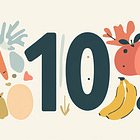Boost Your Mood Naturally—3 Proven Ways Backed by Science
How to heal a low mood without a prescription (sorry Big Pharma!)
After losing my mother to lung cancer, I was offered only a prescription for antidepressants—as if a pill could patch up grief. It felt impersonal, dismissive, and above all, incomplete. That moment opened my eyes: our healthcare system often treats symptoms, not people.
That’s why I started this newsletter—to help others explore more human, whole-person approaches to health.
Today, I want to share evidence-based ways to improve your mood without relying on medication.
I hope you find it helpful.
(1) Rest Assured: Your Mood Depends on It
Nowadays, insomnia and sleep disorders are more common than ever.
In the United States, the Centers for Disease Control and Prevention (CDC) estimate over 35% of adults do not get the minimum recommended 7 hours of sleep each night.
Are you one of them?
This lack of sleep affects our mood and is linked to a higher risk of obesity and mortality from cardiovascular diseases.
Recommended Hours of Sleep by Age
Getting enough sleep depends on your age. Here’s the daily recommended sleep for each group:
Newborn (0–3 months): 14–17 hours
Infant (4–12 months): 12–16 hours (including naps)
Toddler (1–2 years): 11–14 hours (including naps)
Preschooler (3–5 years): 10–13 hours (including naps)
School-age (6–12 years): 9–12 hours
Teen (13–17 years): 8–10 hours
Adult (18–60 years): 7 or more hours
Adult (61–64 years): 7–9 hours
Older adult (65+ years): 7–8 hours
You can find more information here:
(2) Walk It Off—Literally: Movement as Mental Medicine
Breaking up sedentary behavior frequently and intensively, such as by walking instead of standing, is another strategy that has been associated with improved mood in everyday life.
Green exercise in particular involves physical activity in natural environments, and have been found to improve mood and self-esteem. Short engagements in green exercise yield substantial benefits, with diminishing but still positive returns over longer durations.
Beyond the setting itself, physical activity in any form, especially when done outside or with others, has been shown to boost positive emotions and ease symptoms of depression.
This aligns with the mood brightening hypothesis, which suggests that rewarding daily activities can significantly improve mood.
And it turns out, you don’t even have to move to feel the effect. Simply viewing images of nature can enhance mood by reducing activity in the orbitofrontal cortex—a brain region involved in emotional processing.
While movement in natural settings offers even greater benefits, this kind of passive exposure can still have measurable therapeutic effects—especially useful when you're stuck indoors or working from a closed space.
(3) Gut Feeling: What You Eat Shapes How You Feel
The gut—often called the “second brain”—plays a far more important role in our emotional health than many people realize.
This nickname isn’t just catchy; it reflects the reality of the gut’s intricate enteric nervous system, a network of more than 100 million nerve cells (almost as many as the spinal cord!).
This complex system allows the gut to operate independently, while constantly sending signals to the brain in a two-way conversation that shapes how we feel, think, and even respond to stress.
At the heart of this communication lies the gut microbiota—a complex ecosystem of trillions of microorganisms living in our digestive tract, weighing approximately 4.4 pounds in total (yes, you read that right!). These microbes don’t just influence digestion; they help regulate mood, behavior, and mental health.
One of the most effective ways to support this internal ecosystem is through diet.
Higher intake of fruits and vegetables is linked to a lower likelihood of experiencing anxiety, mental disorders, depressive symptoms, and even suicide, reducing the risk of depression by up to 62%.
But naturally, there’s little profit in prescribing broccoli.
Five Daily Portions is Not Enough
The health benefits are observed when consuming 800 grams of fruits and vegetables daily, which equals ten portions of 80 grams.
That’s double the classic “five a day” recommendation!
With ten portions of these examples, you could achieve those benefits:
Fruits
1 medium fruit: kiwi, apple, orange, pear, banana
1 cup of small fruits: blueberries, raspberries, strawberries, blackberries, grapes
½ cup of sliced or diced fruits: melon, mango, pineapple, watermelon
Vegetables
3 heaping tablespoons of cooked vegetables: eggplant, broccoli, zucchini, spinach, peas
3 cups of leafy greens: spinach, kale, lettuce, arugula
½ cup of raw or cooked chopped vegetables: onion, cauliflower, bell pepper, carrot
1 whole medium vegetable: cucumber, tomato, carrot
Tryptophan
Tryptophan is an essential amino acid to produce melatonin and serotonin, the hormones that regulate sleep and mood.
Foods high in tryptophan can also lift mood by affecting mood-regulating neurocircuits via serotonergic mechanisms.
Some examples are: pumpkin seeds, cheddar cheese, turkey, chicken, fish (especially salmon and tuna), soy, nuts, oats, eggs, lentils, dark chocolate, and bananas.
Incorporating these into your diet can positively influence mood and sleep quality, as demonstrated by a study.
Researchers selected participants aged 55 to 75 who ate tryptophan-enriched cereal for breakfast and dinner, while the control group ate regular cereal.
After just one week, those who consumed the enriched cereal showed a significant reduction in anxiety and depression levels and experienced better and longer sleep compared to the control group.
Green Tea
Additionally, regular intake of green tea with specific ratios of its components has been shown to reduce susceptibility to depression-like moods.
These strategies, grounded in the medical literature, offer practical approaches to mood improvement through behavioral, environmental, and nutritional interventions.
To your zenith within,
Sara Redondo, MD, MS
P.S. You’ll find more actionable tips here — no prescriptions required!










Brilliant research .. green tea and pumpkin seeds also prevent cancer. Pumpkin seeds help to prevent parasites ! Great info. Thank you.
I would like to receive your book to help build up my body after a cancer diagnosis. Thanking you in advance, Esther Zellen